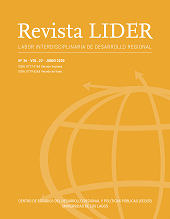Conservation, development and decentralization: Lessons from a public-private territorial management model in Southern Chile
Main Article Content
Abstract
This study addresses the implementation of the Regional System of Protected Areas (SIRAP), a strategy designed with the aim of improving the representativeness of vulnerable ecosystems in rural landscapes and decentralizing the management of protected areas in Chile, this time, considering those ecosystems located on private lands. The objective was to
know what were the challenges faced by local territories to implement this type of category, and which governances are best suited for efficient management of these areas. Through a bibliographic review and documentary analysis, the results of the decentralization process carried out by SIRAP were analyzed in two communes in the Los Ríos region (Chile), where this strategy materialized and resulted in the creation of a new category of protected area called Landscape of Conservation Valle Río San Pedro, which includes the creation of a
“Development Council” and an “Association of Municipalities Conservation Landscapes for biodiversity of the region of Los Ríos”.
Article Details
Downloads

This work is licensed under a Creative Commons Attribution-NonCommercial-ShareAlike 4.0 International License.
